Home Tags Posts tagged with "nicolas maduro"
nicolas maduro
Venezuela has given 48 hours to leave the country to Panama’s ambassador and three other diplomats amid growing tensions over opposition protests.
The move comes a day after President Nicolas Maduro broke diplomatic relations and froze economic ties with Panama.
At least 20 people have died in anti-government protests in Venezuela in the last month.
Nicolas Maduro has accused Panama of conspiring to bring down his government.
The latest fallout comes after Panama requested a meeting at the Organization of American States (OAS) to discuss Venezuela’s crisis.
Four diplomats working at Panama’s embassy, including ambassador Pedro Pereira, were declared “persona non grata” on Thursday, according to Panama’s Deputy Foreign Minister Mayra Arosemena.
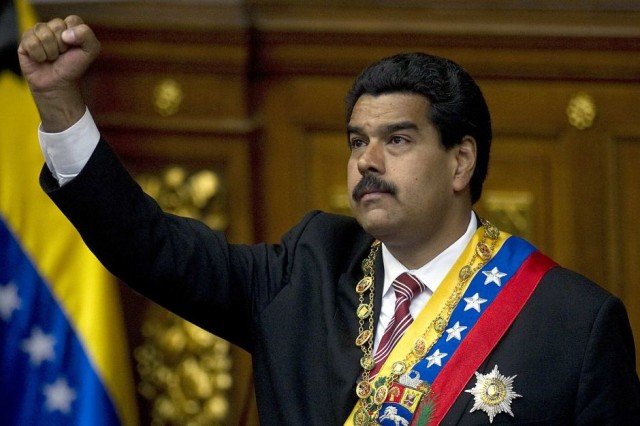
Nicolas Maduro has accused Panama of conspiring to bring down his government
Venezuela’s Foreign Minister Elias Jaua said his country also had suspended debt negotiations over $1 billion owed to Panamanian exporters, according to reports.
Meanwhile a member of Venezuela’s National Guard and a motorcyclist became the latest victims of the unrest in the country on Thursday.
The pair were shot dead during clashes that broke out when a group of men of motorcycles tried to clear opposition barricades in a street in Caracas.
The opposition accuses the government of using armed civilian groups on motorcycles to break up demonstrations.
Thousands of government supporters and troops took part in a huge parade through the centre of the capital, commemorating the first anniversary of former President Hugo Chavez’s death on March 5.
Panama said it was “astonished” by Venezuela’s decision to break diplomatic relations and called Nicolas Maduro’s words “unacceptable”.
[youtube pBR_rQkklsk 650]
Venezuela has broken diplomatic relations and frozen economic ties with Panama, President Nicolas Maduro announced during Hugo Chavez’s first commemoration.
Nicolas Maduro’ decision comes after Panama requested a meeting at the Organization of American States (OAS) to discuss Venezuela’s crisis.
The president was speaking to other Latin American heads of state at events to mark the first anniversary of the death of the Venezualan leader Hugo Chavez.
At least 18 people have died in anti-government protests in the last month.
“I’ve decided to break political and diplomatic ties with the current government of Panama and freeze all trade and economic relations from this moment on,” Nicolas Maduro told the presidents of Cuba, Raul Castro, Uruguay, Jose Mujica, and Bolivia, Evo Morales, among other leaders gathered around the tomb of Hugo Chavez.
Panama’s President Ricardo Martinelli expressed surprise at Venezuela’s decision.
“Panama only hopes that this brother nation finds peace and strengthens its democracy,” Ricardo Martinelli wrote on Twitter.
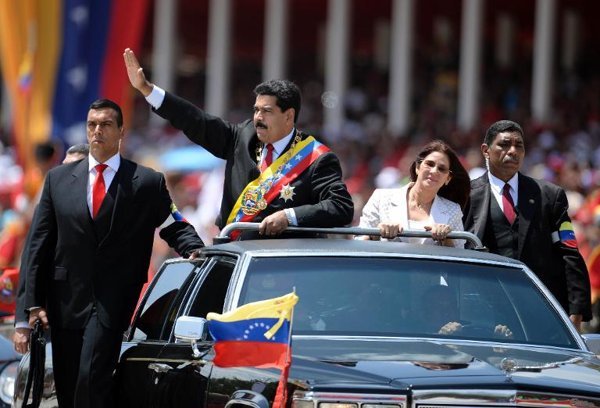
Nicolas Maduro announced that Venezuela has broken diplomatic relations and frozen economic ties with Panama
Panama’s official statement said the country was “astonished” and called Nicolas Maduro’s words “unacceptable”.
“The measure announced by President Maduro should not become a smoke screen intended to hide reality,” it read.
Earlier, thousands of government supporters and troops took part in a huge parade through central Caracas, commemorating the first anniversary of former President Hugo Chavez’s death.
In other parts of Caracas, anti-government protesters kept up their barricades, despite an appeal made by opposition leaders to “respect” the anniversary.
Last week, the government of Panama requested an urgent meeting of OAS member-states to discuss the unrest in Venezuela.
On Wednesday, the OAS said a meeting would take place the next day behind closed doors to decide whether or not to convene the region’s foreign ministers over the issue.
Nicolas Maduro accused the Panamanian government of conspiring to bring down his government.
“There are moves by the United States government in accord with a lackey government of a right-wing president which has been creating the conditions for the OAS and other bodies to step towards an intervention in our country,” Nicolas Maduro said.
Nicolas Maduro also criticized OAS President Jose Miguel Insulza, who had suggested earlier that a group of observers could be sent to Venezuela – if its government and the opposition found it useful.
[youtube wL6hkl4v_us 650]
The first anniversary of Hugo Chavez’s death is being marked in Venezuela.
Hugo Chavez died of cancer after 14 years as president.
His successor, Nicolas Maduro, is leading a parade and a ceremony later at the military headquarters in Caracas where Hugo Chavez is buried.
The anniversary comes at a time of tension, with people staging daily anti-government demonstrations.
Venezuelans are deeply divided about Hugo Chavez’s legacy.
His supporters point to the significant reductions in inequality, poverty and malnutrition which Venezuela experienced under his leadership to explain their unwavering backing for “Chavismo”, his distinct brand of socialism.
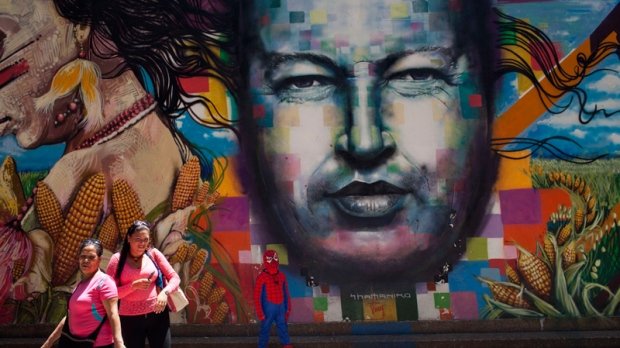
The first anniversary of Hugo Chavez’s death is being marked in Venezuela
Hugo Chavez’s critics accused him of being “dictatorial” and of championing the poor at the expense of Venezuela’s middle class.
They say he and current President Nicolas Maduro, who has promised to continue the policies of his predecessor, have ruined the economy of the oil-rich country by alienating foreign investors.
Tens of thousands of people have taken part in marches over the past month demanding that more be done to curb insecurity and improve the economy.
Venezuela has one of the world’s highest murder rates and official figures published in December put inflation at 56.2%.
There have also been pro-government marches, during which thousands of people have expressed their support for Nicolas Maduro, whom they describe as Hugo Chavez’s “son” and “heir”.
Wednesday’s ceremonies will be attended by left-wing leaders from the region, including Cuba’s Raul Castro, Daniel Ortega of Nicaragua, and Bolivia’s Evo Morales.
Opposition leaders have asked their supporters to “respect” the anniversary and to avoid further clashes with security forces, although a march has been scheduled to take place in the central city of Valencia.
[youtube jcb38OXweco 650]
Venezuela’s police and National Guard have used tear gas to break up a student demonstration in the capital, Caracas.
Hundreds of protesters were demanding the release of fellow students detained during two weeks of unrest, and called a fresh march for Sunday.
In another part of Caracas, a large pro-government march was held.
Earlier this week, President Nicolas Maduro declared an early start to the week-long Carnival public holiday in an attempt to end the unrest.
On Monday, Venezuela’s Attorney General Luisa Ortega said 13 people had died in the violence, although President Nicolas Maduro put the figure of protest-related deaths at more than 50 on Wednesday.
Despite the start of the long holidays on Thursday, students again gathered in Caracas.
“There’s no Carnival for anybody here. Here we are still on the streets, committed to the fight,” student leader Juan Requesens told EFE news agency.
Their peaceful demonstration ended in clashes with security forces when some masked protesters tried to block a road.
Police and the National Guard used tear gas to break up the protest, while demonstrators hurled stones at them.

Venezuela’s police and National Guard have used tear gas to break up a student demonstration in Caracas
Juan Requesens said there would be a “big march” on Sunday.
At the presidential palace in Caracas, hundreds of Nicolas Maduro’s supporters took part in a celebration of the 25th anniversary of the Caracazo, the violent protests against economic measures imposed in 1989 by the government.
There were no reports of other large protests in other parts of Venezuela on Thursday.
Meanwhile, Venezuelan Foreign Minister Elias Jaua, who is in Uruguay as part of a regional tour, said he believed the Union of South American Nations (UNASUR) would be a better forum to discuss the current political crisis in Venezuela.
Panama had suggested the Organizations of American States (OAS) should discuss the issue, but Venezuela requested the motion to be cancelled.
“UNASUR has been much more efficient on these issues than the OAS. How many coups has the OAS stopped in its existence? On the contrary, it has legitimized many,” Elias Jaua told reporters.
On Wednesday, Nicolas Maduro held a “national peace conference” without the participation of the opposition.
The Roman Catholic church and a major business federation took part in the meeting.
The current unrest started more than two weeks ago with student protests in the western states of Tachira and Merida demanding increased security. They also complained about record inflation and shortages of staple items.
[youtube dNv8KKTk7mU 650]
The number of deaths which can be connected to two weeks of anti-government protests in Venezuela has risen above 50, President Nicolas Maduro has said.
Official estimates put the number killed in clashes at 13.
Nicolas Maduro has blamed the violence on fascist groups.
The president was speaking ahead of a meeting intended to put an end to the unrest, sparked by anger at high inflation, rampant crime and food shortages.
But the main opposition coalition has refused to attend, calling it a farce.
“We will not lend ourselves to a sham dialogue that would end in a mockery of our compatriots,” the bloc’s vice-president, Jorge Arreaza, told reporters.
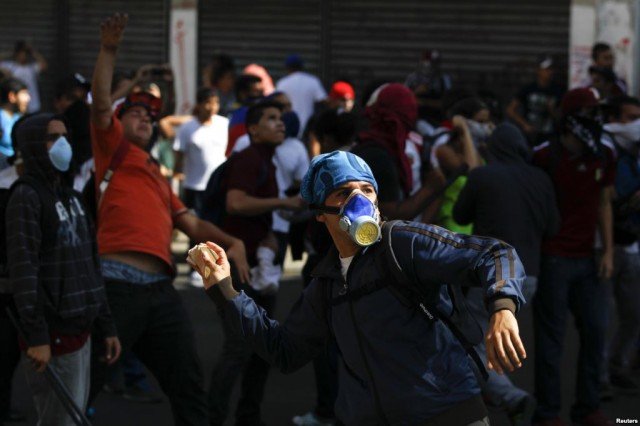
The number of deaths which can be connected to two weeks of anti-government protests in Venezuela has risen above 50, President Nicolas Maduro has said
On Monday, Venezuela’s Attorney General Luisa Ortega said 13 people had died in protest-related violence. At the time, opposition groups said the number of dead was at least 15.
Speaking at a pro-government rally staged by farmers outside the presidential palace, Nicolas Maduro said there were “more than 50 dead as a result of road blocks and barricades”.
“Yesterday, an 84-year-old lady died in eastern Caracas because she was held up at a road block for three hours and died in her family’s car of a heart attack,” he said.
He did not further clarify his reasons for giving a steep increase in the death toll.
Elsewhere in Caracas, hundreds of people, mostly women, led by the wife of imprisoned opposition leader Leopoldo Lopez protested against the government’s handling of the demonstrations.
[youtube PwNBzmmU3h8 650]
Police and opposition demonstrators have clashed in Venezuela at the end of a march that gathered tens of thousands of people in Caracas.
Several people were injured, as police fired tear gas and activists hurled stones in the Altamira district.
Supporters of left-wing President Nicolas Maduro marched in central Caracas and other cities.
Ten people have now died in nearly two weeks of protests, which Nicolas Maduro has called a coup attempt.
Nicolas Maduro says the violence is part of a strategy devised by right-wing groups, with the support of the US, to destabilize his government.
“We have a strong democracy. What we don’t have in Venezuela is a democratic opposition,” Nicolas Maduro told thousands of his supporters in Caracas.
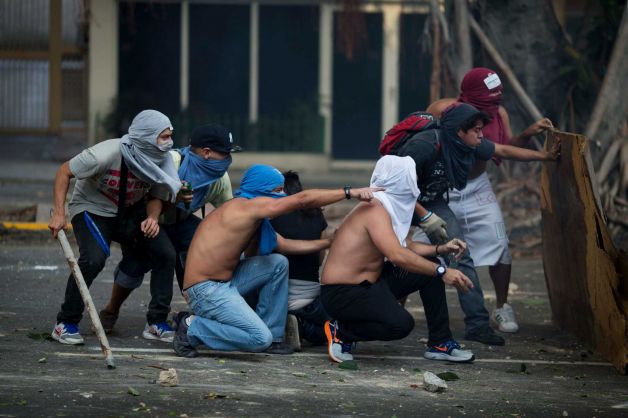
Police and opposition demonstrators have clashed in Venezuela at the end of a march that gathered tens of thousands of people in Caracas
Nicolas Maduro was elected last April, following the death of Hugo Chavez, who was in office for 14 years.
Opposition leader Henrique Capriles, who was defeated in last year’s presidential election, led a march in the capital.
He spoke against the arrest, on Tuesday, of fellow opposition politician Leopoldo Lopez, accused by the government of inciting violence.
Henrique Capriles called on his supporters to carry on protesting, but to avoid any form of violence.
“There are millions of reasons to protest, there are so many problems, so many people suffering. But his movement we have built must be different,” he said.
The opposition’s main grievances are rampant crime, high inflation and the shortage of many staples. It blames the economic problems on the left-wing policies of the past 15 years.
Opposition demonstrators also took part in marches in western Tachira and Merida states.
The current wave of protests began on 12 February. Three people were shot dead at the end of those marches in Caracas by unknown gunmen.
Daily protests have been held in Caracas for the past 11 days.
[youtube YgHPybDbDks 650]
Venezuela’s President Nicolas Maduro has invited President Barack Obama to join him in talks aimed at resolving the problems between his country and the US.
Nicolas Maduro said the meeting would help “put the truth out on the table”.
He has accused US conservatives and media organizations of plotting to overthrow his government.
Earlier on Friday Venezuela revoked the accreditations of CNN reporters covering the country’s crisis. Eight people have died in recent protests.
In a news conference on Friday, Nicolas Maduro said: “I call for a dialogue between Venezuela and the United States and its government.
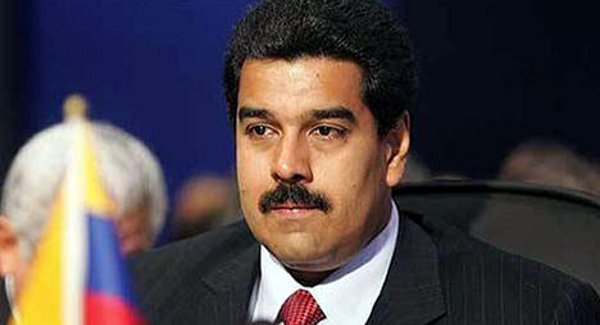
Venezuela’s President Nicolas Maduro has invited President Barack Obama to join him in talks aimed at resolving the problems between his country and the US
“Let’s initiate a high-level dialogue and let’s put the truth out on the table.”
The dialogue will be “difficult and complex”, Nicolas Maduro said, until the American government accepted “the full autonomy and independence of Latin America”.
Last week, Venezuela expelled three US diplomats accused of meeting violent groups linked to the opposition.
Earlier this week, Venezuela had revoked the accreditation of CNN’s Caracas-based reporter, Osmary Hernandez, and those of two other CNN journalists sent to Venezuela to cover a wave of opposition marches.
The government says the protests are part of a coup attempt.
US Secretary of State, John Kerry, denounced the latest action on Friday, saying: “This is not how democracies behave.
“I call on the Venezuelan government to step back from its efforts to stifle dissent through force and respect basic human rights.
“The solution to Venezuela’s problems can only be found through dialogue with all Venezuelans, engaging in a free exchange of opinions in a climate of mutual respect.”
[youtube VntTvkgat2c 650]
CNN says Venezuela has revoked the accreditation of its Caracas-based reporter, Osmary Hernandez.
Two journalists who had been sent to Venezuela to cover the current crisis had their working permits cancelled.
President Nicolas Maduro had vowed to expel CNN unless it “rectified” its coverage of recent opposition marches.
Eight people have been killed in the protests, according to the government.
Chief Prosecutor Luisa Ortega Diaz said 137 people had been injured in the current series of protests, which began earlier this month.
Opposition leader Leopoldo Lopez, who called for the marches, was detained on Tuesday during a protest in Caracas.
The government accused him of inciting violence as part of a right-wing coup plot.
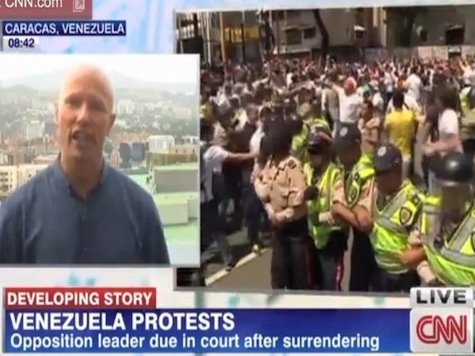
CNN says Venezuela has revoked the accreditation of its Caracas-based reporter
CNN is one of several media organizations complaining that their freedom of expression had been restricted by the Venezuelan government.
Last week, the government removed Colombian TV news channel NTN24 from channels offered by Venezuelan cable operators.
On Thursday, during a live broadcast, Nicolas Maduro threatened to “take action” against CNN unless it ceased what he described as “hostile coverage” of events in Venezuela.
“Enough war propaganda, I won’t accept war propaganda against Venezuela. If they don’t rectify themselves, out of Venezuela, CNN, out,” he said.
“They want to say to the world that there’s a civil war in Venezuela.”
CNN says Venezuelan officials asked the two journalists who had their work permits cancelled – Angela Janiot and Rafael Romo – when they would leave the country.
In a statement, CNN said it was still negotiating with the authorities.
“We hope the government reconsiders its decision. Meanwhile, we will carry on covering events in Venezuela in a fair, accurate and balanced manner,” read the statement.
On Sunday, Nicolas Maduro ordered the expulsion of three US diplomats. He accused them of meeting student leaders to conspire against his government.
The three diplomats deny the allegations.
A former union leader and close ally of the late president, Hugo Chavez, Nicolas Maduro was elected by a narrow margin last April.
[youtube L1kaF39JlK4 650]
President Nicolas Maduro has threatened to expel the CNN staff from Venezuela over its reporting of recent protests there.
Nicolas Maduro said he would take action if CNN did not “rectify its coverage”.
Earlier, Nicolas Maduro said he was sending troops to the western state of Tachira, where there has been continuing unrest.
With tensions running high, the leader of the opposition, Henrique Capriles, has called for a fresh, peaceful anti-government march on Saturday.
There were reports of further clashes in the state of Tachira and in districts of the capital, Caracas.
At a news conference, Henrique Capriles rejected violence and said he was ready for dialogue, but claimed the government was not willing to listen.
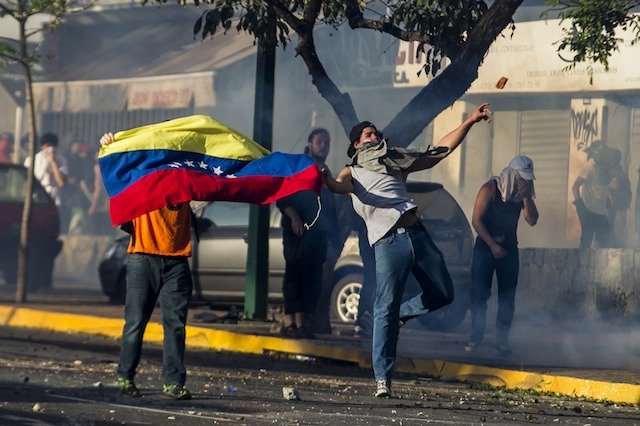
Nicolas Maduro has threatened to expel the CNN staff from Venezuela over its reporting of recent protests there
“In this turbulent hour, we call on the students and on those on the streets not to fall into the trap of violence,” Henrique Capriles said before showing several videos allegedly containing evidence of abuses by the security forces.
On national television, President Nicolas Maduro accused his opponents of promoting violence.
He vowed to take the perpetrators of attacks against the Caracas metro, who were allegedly also caught on video, to court.
Nicolas Maduro also lashed out against the coverage of the protests by foreign news organizations.
“Enough war propaganda, I won’t accept war propaganda against Venezuela. If they don’t rectify themselves, out of Venezuela, CNN, out,” he said.
Last week, the government removed Colombian TV news channel NTN24 from channels offered by Venezuelan cable operators.
Nicolas Maduro also ordered the expulsion of three US diplomats this week.
Earlier on Thursday, a Venezuelan court ordered that detained opposition politician Leopoldo Lopez remains in custody pending further hearings.
Leopoldo Lopez of the opposition Popular Will party handed himself over to the authorities on Tuesday.
The government is charging Leopoldo Lopez with intentional arson, inciting violence, damage to public property and conspiracy.
[youtube 2eg1k_PTX08 650]
Venezuela is expelling three US consular officials, accusing them of meeting students involved in anti-government protests.
The country has seen growing political tension and rallies, with three protesters dying in clashes last week.
An arrest warrant has been issued for opposition leader Leopoldo Lopez, who has pledged to lead a march in the capital Caracas on Tuesday.
The US has expressed concern about arrests of opposition protesters.
President Nicolas Maduro did not name the US officials being expelled, when he made the announcement in a national TV broadcast, but said the foreign ministry would give details later.
“It’s a group of US functionaries who are in the universities. We’ve been watching them having meetings in the private universities for two months. They work in visas,” the president said.
“Venezuela doesn’t take orders from anyone!” he added.
On Saturday, US Secretary of State John Kerry issued a statement expressing concern about the rising tensions in Venezuela.
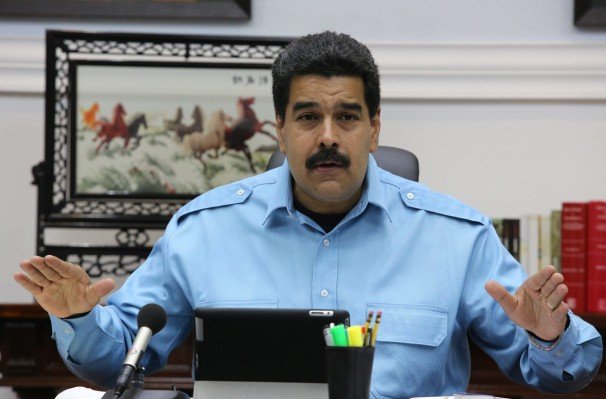
Venezuela is expelling three US consular officials, accusing them of meeting students involved in anti-government protests
“We are particularly alarmed by reports that the Venezuelan government has arrested or detained scores of anti-government protestors and issued an arrest warrant for opposition leader Leopoldo Lopez,” read the statement.
The main opposition grievances are high inflation, crime and the shortage of some staples.
The government has blamed the shortages on “saboteurs” and “profit-hungry corrupt businessmen”.
Opposition leader Leopoldo Lopez was last seen on Wednesday, when three men were shot dead at the end of opposition protests in the capital.
President Nicolas Maduro says an arrest warrant was issued against Leopoldo Lopez shortly after the incidents.
Nicolas Maduro has accused Leopoldo Lopez of inciting violence as part of a coup plot against his left-wing government.
The opposition says they were killed by pro-government militias known as “colectivos”.
Leopoldo Lopez, 42, is a former mayor of Chacao district, in eastern Caracas. He organized the recent protests against the government.
On Sunday morning, Venezuelan police searched the houses of Leopoldo Lopez and his parents.
Hours later, he posted a new message on Twitter and a three-minute long video. He said he had not committed any crime and challenged the authorities to arrest him at the next protest.
“I want to invite all of you to join me on a march on Tuesday from Venezuela Square [in central Caracas] towards the Justice Ministry building, which has become a symbol of repression, torture and lies,” Leopoldo Lopez said on the video.
He called on his supporters to dress in white, “to reaffirm our commitment to peace”.
“I will be there to show my face. I have nothing to fear. I have not committed any crime. If there is any order to illegally arrest me, well, I will be there,” added Leopoldo Lopez.
For his part, President Nicolas Maduro called on oil workers from the state company PDVSA to march to the presidential palace on Tuesday.
[youtube 2_HGXidPLyY 650]
Opponents and supporters of Venezuela’s President Nicolas Maduro have taken to the streets of Caracas in rival marches.
The demonstrations come at a time of growing political tension in Venezuela.
Three people were killed during anti-government protests on Wednesday, and some 100 students were arrested.
President Nicolas Maduro accused the opposition of stirring up trouble as part of a coup plot and urged his supporters to march for peace on Saturday.
Government supporters began arriving at Venezuela Square, in central Caracas, in the morning.
They were dressed predominantly in red or in Venezuela’s national colors – blue, yellow and red.
Hours later Nicolas Maduro addressed thousands of his supporters in Bolivar Avenue. The march was broadcast live on national television.
“I call all the people to the streets in order to defend peace,” he said.
Nicolas Maduro warned that his government would not give in to those he described as “fascists,” including former president of neighboring Colombia, Alvaro Uribe.

Nicolas Maduro addressed thousands of his supporters in Bolivar Avenue
“Alvaro Uribe is behind this, financing and directing these fascist movements.”
“He intended to use a Venezuelan television channel [NTN24] to do the same they did on 11 April 2002,” Nicolas Maduro said, referring to a failed military coup against the late President, Hugo Chavez.
Alvaro Uribe, a centre-right politician, was a fierce enemy of Hugo Chavez and accused the late president of supporting Colombia’s largest rebel group, the Farc.
Nicolas Maduro said police had been looking for opposition leader Leopoldo Lopez, accused of ordering “all these violent kids, which he trained, to destroy half of Caracas to then go into hiding”.
Leopoldo Lopez has not been seen in public since an arrest warrant was issued for him on Wednesday.
US Secretary of State John Kerry has issued a statement expressing concern by the rising tensions in Venezuela.
Opposition demonstrators, including a movement known as Mothers in White, gathered at Las Mercedes neighborhood in eastern Caracas.
Thousands of people, mostly wearing white, marched towards the Courts of Justice building and stopped for a memorial ceremony to the three demonstrators killed on Wednesday: Bassil da Costa, Juan Montoya and Robert Redman.
Student leader Enrique Altimari said the main aim of their “peaceful protest” was to “pay tribute to the victims”.
He said the march would end before night fell, to avoid a repeat of the incidents of Wednesday.
The three victims were shot dead by unknown gunmen as the opposition marches came to an end.
The opposition march ended before dusk with clashes between police, who fired tear gas in attempts to disperse the crowd, and demonstrators who hurled stones.
Reports say three people were injured.
The main opposition grievances are high inflation, crime and the shortage of some staples.
Venezuela’s government has blamed the shortages on “saboteurs” and “profit-hungry corrupt businessmen”.
[youtube PRMTMOyd-98 650]
[youtube vL47Pq_MePM 650]
Venezuela’s government has announced measures to address the country’s foreign currency crisis and boost the economy.
Oil Minister Rafael Ramirez says Venezuelans travelling abroad will no longer be allowed to obtain foreign exchange at the official rate of 6.3 bolivars per US dollar.
They will have to pay a higher rate, determined by weekly currency auctions.
The official rate will be used only for essential goods, such as medicine, industrial supplies and food.
“The big discussion here is whether we give dollars to travelers or we import food,” said Rafael Ramirez.
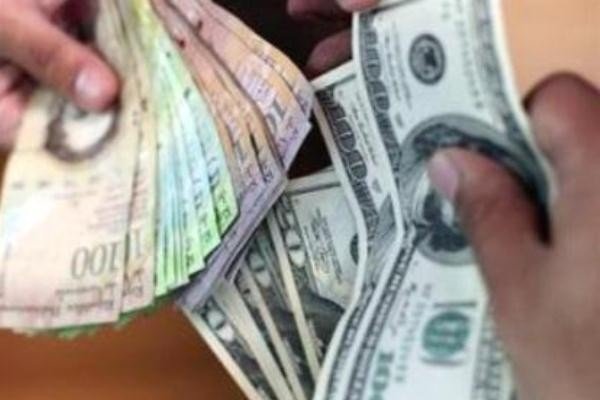
Venezuela’s government has announced measures to address the country’s foreign currency crisis and boost the economy
The weekly dollar auctions will be increased to $220 million a week to benefit private companies that have been struggling to import raw materials and other supplies.
Rafael Ramirez, who is also the president of state-owned oil company PDVSA, promised to unveil further details of the new multi-tier currency system.
Despite its oil wealth, Venezuela has faced a shortage of staple goods, such as sugar, cooking oil and toilet paper.
Many businessmen say the shortages are due to the mismanagement of the economy, including the tough currency controls introduced in 2003 by the late president, Hugo Chavez.
But his successor President Nicolas Maduro has repeatedly accused “unscrupulous businessmen” of manufacturing the crisis to undermine his left-wing policies.
In his state of the nation address before the National Assembly last week Nicolas Maduro vowed to introduce tougher penalties for “sabotage and speculation”.
On the black market, dollars can be bought and sold at 10 times the official 6.3 exchange rate.
Venezuela’s President Nicolas Maduro accuses the “telenovelas” (TV soap operas) of spreading “anti-values” to young people by glamorizing violence, guns and drugs.
The criticism follows attacks last year by Nicolas Maduro on violent video games and the Hollywood movie Spider-man.
On Monday night, his vice president, Jorge Arreaza, met with broadcast and pay TV operators to review the prime time lineup, warning that they could be in violation of a 2004 law mandating “socially responsible” programming. The two sides will meet in a week with the aim of drafting an agreement on meeting those obligations.
It’s unclear whether the government will take steps to restrict programming or impose harsher rules on telenovelas, which are hugely popular across Latin America.
Analysts say arm-twisting is unlikely to reduce Venezuela’s high homicide rate, which the UN ranks as the fifth worst globally, and they warn that Nicolas Maduro’s campaign could be used as an excuse to further gag media criticism of the government.
“It’s a smoke screen to distract attention away from the real causes” of violence and crime, said Roberto Briceno Leon of the Venezuelan Observatory of Violence, which estimates Venezuela’s murder rate has quadrupled in 15 years of socialist rule.
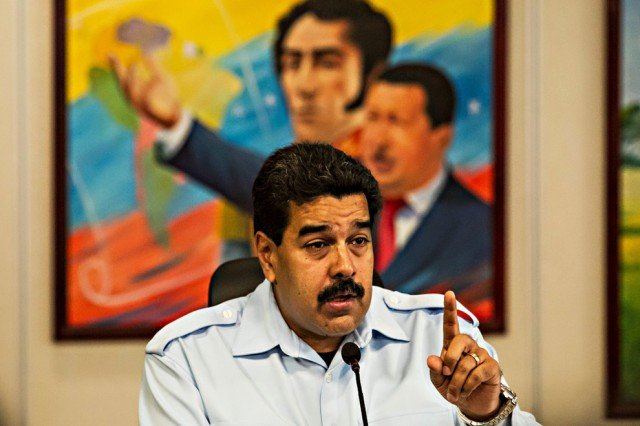
President Nicolas Maduro accuses the telenovelas of spreading anti-values to young people by glamorizing violence, guns and drugs
Pressure on the government to crack down on crime heated up this month after former Miss Venezuela Monica Spear and her ex-husband were shot to death by robbers, with their 5-year-old daughter looking on.
The double slaying shocked even Venezuelans hardened by rampant bloodshed and put the government on the defensive on an issue that surveys say is the biggest concern among voters.
In his state of the union speech last week, Nicolas Maduro took aim at a popular soap opera, De todas maneras Rosa, produced by Venevision.
He accused the nation’s biggest broadcaster of profiting from violence by celebrating the crimes of one of the melodrama’s lead characters, Andreina Vallejo, a psychopathic former beauty queen who fatally poisons her own mother to hide the paternity of her son.
“Mama, everybody in the world knows that the relationship between parents and their children is completely accidental,” Andreina Vallejo says as her mother gasps for breath in her daughter’s arms.
Alberto Barrera Tyszka, the creator of several soap operas, said television only reflects the alarming levels of violence present in society and is already tightly regulated for content deemed unsuitable for minors. He said Nicolas Maduro should turn his attention to the root causes of crime instead.
Venezuela’s government disputes those findings, but has blocked access to official crime statistics in recent years. Officials say the rate last year was 39 per 100,000 people — a level that’s still the highest in South America and eight times the US rate.
[youtube RG963Y5B27E 650]
Venezuela’s President Nicolas Maduro suggested Wednesday that the murder of former beauty queen Monica Spear and her ex-husband Thomas Berry was a targeted hit and not a random robbery gone wrong.
“That assassination seems more like a contract killing,” Nicolas Maduro said.
“We have identified those involved in this assassination and we are going to look for them.”
Nicolas Maduro provided no evidence that that Monica Spear was the victim of a murder-for-hire. Police had earlier described the Monday night shooting as a botched highway heist and said they were questioning five people.
The high-profile shooting — which left Monica Spear’s 5-year-old daughter wounded — has sparked outrage over violent crime in Venezuela, which had more than 24,000 homicides last year.
Protesters, including some celebrities, held a march to demand better public safety on Wednesday.

After winning the title of Miss Venezuela and competing in the Miss Universe pageant, Monica Spear appeared in a half-dozen Spanish language soap operas
President Nicolas Maduro called a security meeting with all the country’s governors and the mayors of 79 cities with high crime rates.
“If there’s any sense to this pain, it has to be so that we all wake up,” he said of Monica Spear’s death.
Monica Spear’s ex-husband, Thomas Henry Berry, 39, an adventure tour operator, moved to the US about 15 years ago after being shot, but returned to Venezuela in 2006.
Although the couple split about two years ago, they remained closed and spent holidays and vacations together with their daughter, Maya, friends and relatives said.
They had spent the New Year on an idyllic road trip that took them from scenic Merida to the beach and to the plains, where Monica Spear, 29, who was raised on a ranch, rode horses. A video she posted to Instagram showed her blowing kisses to the camera on horseback.
After winning the title of Miss Venezuela and competing in the Miss Universe pageant, Monica Spear appeared in a half-dozen Spanish language soap operas, most recently Pasion Prohibida and Flor Salvaje on Telemundo.
[youtube df9ie68z8xs 650]
According to Venezuela’s National Electoral Council, the governing United Socialist Party (USP) has won the greatest share of the vote in Sunday’s local elections.
With most votes counted, the USP has 49% while the opposition has about 43%.
The opposition was ahead in most of the larger cities, including the capital, Caracas, while the governing party won in rural areas.
The elections have been seen as a key test for President Nicolas Maduro, who replaced the late Hugo Chavez in April.
Since November, Nicolas Maduro has been ruling by decree, promising to tackle corruption and control price rises.
The opposition accuses Nicolas Maduro of failing to deal with crime, inflation and a shortage of basic goods.
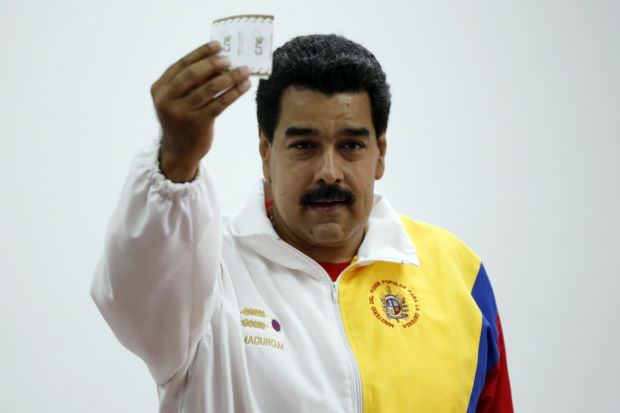
Nicolas Maduro’s United Socialist Party has won the greatest share of the vote in Venezuela’s local elections
Local elections in Venezuela are usually low key, but this one was filled with expectations for the government and the opposition.
Voters were electing mayors to 337 municipalities and officials to more than 2,000 city councils.
The opposition won mayoral races in the capital, Caracas, and the country’s second city. Maracaibo. They also won the capital of Barinas, from where former Hugo Chavez hailed.
So far, the USP has won in 196 of the municipalities being contested, while the opposition took 53, and independents another eight. The remainder have yet to be declared.
Nicolas Maduro called the results a “grand victory”, telling supporters at a rally in Caracas that “the Bolivarian Revolution continues now with more strength”.
The opposition’s failure to win a majority of the votes cast or significantly increase the number of municipalities under its control from the 46 won in the 2008 local elections was a disappointment to its leader Henrique Capriles.
Sunday’s elections coincided with the anniversary of Hugo Chavez’s famous speech in which he announced that his cancer had returned and named Nicolas Maduro as his preferred successor.
[youtube iRGPn5Swiqc 650]
President Nicolas Maduro has signed a decree controlling the price of new and second-hand cars in Venezuela.
New cars are currently hard to find, and Venezuelans often have to pay very high prices for an used car.
Nicolas Maduro, who previously legislated on the prices of electronics, toys and clothes, has accused criminal gangs of creating artificially high prices in the used car market.
The legislation says old cars cannot be sold at prices higher than new cars.
More details will be available when the legislation (decree number 625) is published on Thursday.
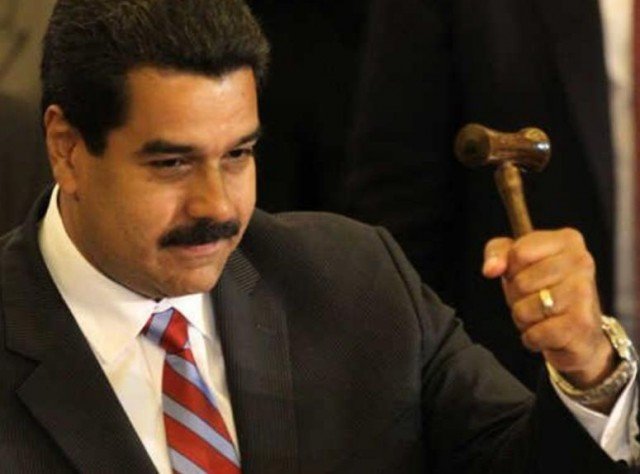
Nicolas Maduro has signed a decree controlling the price of new and second-hand cars in Venezuela
People will be “expressly forbidden to speculate on the prices of second-hand vehicles as though they were new,” Nicolas Maduro told the official Agencia Venezoelana de Noticias.
Those who break the new law will face jail sentences of six to 12 years, Nicolas Maduro said.
The government hopes that the regulations will put a halt to a popular loophole used by Venezuelans to guard against one of the world’s highest inflation rates (21.1% in 2012).
But critics say government intervention will encourage the black market.
They blame the government’s left-wing policies for keeping foreign investment away and hurting the economy.
Nicolas Maduro was elected in March by a narrow margin, succeeding the late President Hugo Chavez, who died of cancer after 14 years in office.
Last month, Nicolas Maduro requested special powers to rule by decree for a year to deal with the economic crisis.
This is the third decree Nicolas Maduro has signed since he was granted the controversial special powers.
Venezuela’s President Nicolas Maduro has said he has proof that Monday’s massive power cut in the capital Caracas and other cities was caused by “right-wing” saboteurs.
Appearing on state TV, Nicolas Maduro showed a picture of what looked like a cut conductor cable.
He said the saboteurs’ aim was to destabilize the country ahead of local elections scheduled for this weekend.
Caracas’ metro ground to a halt and people had to be led out of shops and offices – but power was later restored.
Government opponents say poor maintenance was the likely cause of the blackout.
Power cuts are common in Venezuela, especially in the inland states, but they rarely affect the capital.
Speaking on state TV, Nicolas Maduro said that “we always face these attacks by the right-wing fascists”.

Nicolas Maduro has said he has proof that massive power cut in Caracas and other cities was caused by “right-wing” saboteurs
“They wanted to make me, as president of the republic, decree a state of emergency and suspend the elections.
“Whoever made this criminal attack wanted to leave our Venezuela without electricity for 24 to 48 hours… thinking that would convince people not to continue with the revolution.”
Nicolas Maduro promised to give more details on Wednesday.
He earlier tweeted that the outage had been triggered in the same place as a blackout in September.
The power cut plunged Caracas into darkness after 20:00 on Monday as Nicolas Maduro was addressing the nation on television.
The blackouts did not affect Venezuela’s oil refineries, which are powered by separate generator plants.
Sometimes after the outage, Electricity Minister Jesse Chacon said power had been restored to most of Caracas. He said the blackout had originated in central Venezuela.
The opposition says the governments of President Nicolas Maduro and his predecessor, Hugo Chavez, have failed to maintain the power grid to meet growing demand, instead resorting to conspiracy theories to divert attention from mismanagement.
Correspondents said that while Caracas was in darkness, people could be heard banging pots – a frequent means of protest.
[youtube l4rh6uGZ090 650]
Henrique Capriles – Venezuela’s opposition leader – has told a crowd of supporters not to feel intimidated and to vote in upcoming local elections.
Speaking in the capital, Caracas, Henrique Capriles said not voting on December 8 could be “very costly”.
Henrique Capriles was speaking as thousands turned out for a day of protest.
On Wednesday, the National Assembly gave President Nicolas Maduro controversial new powers to rule by decree.
Nicolas Maduro says the powers will enable him to fight corruption and fix the economy.
The National Assembly’s measure allows Nicolas Maduro to govern without consulting parliament for 12 months.
Despite being a big oil producer, Venezuela is facing shortages of food and other essential goods, as well as power cuts and 54% inflation.

Henrique Capriles has told a crowd of supporters not to feel intimidated and to vote in upcoming local elections
Nicolas Maduro has already forced retailers to slash prices by up to 60%, as part of his fight against what he calls “economic sabotage”.
The government has also imposed strict controls over the sale of foreign currency, to combat a growing black market in dollars.
The opposition accuses Nicolas Maduro of planning to use his new powers to suppress its activities.
Local elections will take place in two weeks.
“Everybody has to overcome their fears and vote. Voting doesn’t cost a thing, but not doing it can be very costly,” Henrique Capriles, who narrowly lost to Nicolas Maduro in April’s presidential election, told the crowd on Saturday.
Henrique Capriles said two of his aides were detained without explanation on Thursday night.
He accused Nicolas Maduro of being too cowardly to arrest him, relying instead on detaining people around him.
“Why don’t they come for me? Maduro, don’t be a coward, come on,” Henrique Capriles told supporters.
One of those arrested was man in charge of organizing Henrique Capriles’ travel agenda, Alejandro Silva.
The government confirmed two members of the opposition had been arrested, accused of planning to provoke disturbances during Saturday’s protests.
[youtube jmb1RBOjiQo 650]
Venezuela’s National Assembly has helped President Nicolas Maduro to move closer to decree powers.
Under the new measures Venezuela’s president would be able to govern by decree for 12 months.
The bill still needs to be revised by a special commission and debated for a second time, but correspondents do not expect significant changes to be made.
Nicolas Maduro says he will use it to tackle corruption and the economic crisis. However, critics fear he may use it to silence the opposition.
The approval of the first reading of the bill comes after a member of parliament, Maria Aranguren, who defected to the opposition was stripped of her parliamentary immunity on Tuesday, being replaced by a government loyalist.
This provided the one remaining vote that the government was missing to achieve the 99 votes needed for the approval of the “Ley Habilitante”, or Enabling Act.

Nicolas Maduro says he will use the special powers to tackle corruption and the economic crisis
The vote did not come as a surprise, but the opposition has openly criticized the move saying the government will use it to clamp down on opponents ahead of local elections in December.
“The only objective of this enacting is to persecute government critical voices in society, the NGOs and the political parties with different views,” opposition parliamentary Eduardo Gomez Sigala told EFE news agency.
Nicolas Maduro first asked parliament in October to grant him special powers to fight corruption and what he called “economic sabotage”.
The country is facing shortages of food and essential goods, power cuts and around 54% annual inflation.
The government recently seized many high street shops selling its merchandise at reduced prices, because they were allegedly overcharging consumers.
Venezuela also imposed strict controls over the sale of foreign currency to combat the growing black market of dollars.
Former President Hugo Chavez, who died of cancer in March, resorted to Enabling Acts four times during his 14 years in power.
Nicolas Maduro has pledged to continue his policies but does not command the same support enjoyed by Hugo Chavez.
[youtube r6wBb9eREBE 650]
President Nicolas Maduro announced the Christmas season would come early in Venezuela and holiday bonuses would be issued in November.
Nicolas Maduro said state workers will receive the first two-thirds of their Christmas bonuses and pensions on November 10-11 instead of December this year in what the president said was an effort to lift people’s spirits, NPR reported last week.
“We made Christmas earlier because happiness and The Nativity and waiting for the arrival of the baby Jesus, it is the best medicine,” Nicolas Maduro said at the Socialist Christmas Fair in Caracas.
During his visit to the so-called Socialist Christmas Fair 2013, organized by the government in a central area of Caracas, Nicolas Maduro exchanged a few words with actors posing as the Three Kings, sang traditional Venezuelan Christmas songs and witnessed the sale of typical holiday food and items.
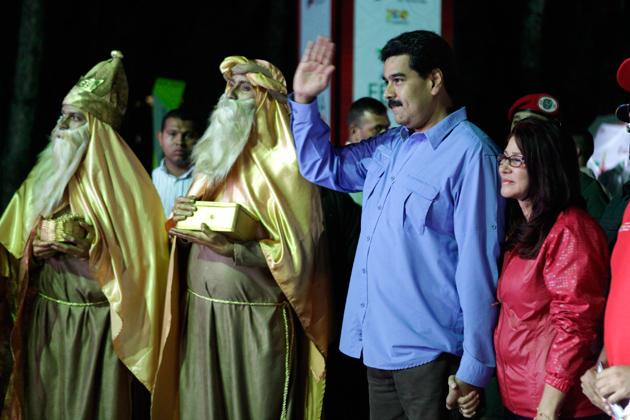
President Nicolas Maduro announced the Christmas season would come early in Venezuela and holiday bonuses would be issued in November
Last weekend Nicolas Maduro lit the Nativity lights at the Presidential Palace of Miraflores and said that the last two months of the year should be premonitory of what 2014 will be.
“Merry Christmas 2013, Christmas early, early victory, early happiness for the whole family,” Nicolas Maduro said.
“We wanted to declare the arrival of Christmas because we want happiness for everyone,” he added.
Political experts, though, said the move may be an effort by Nicolas Maduro to get votes for municipal elections on December 8, NPR reported.
Nicolas Maduro won by a slim margin in the spring, and Venezuela’s economy has been suffering, with 45% inflation and a shortage of toys in retail stores for the holiday season.
[youtube tL3QutwQcos 650]
President Nicolas Maduro has ordered their seizure of Daka chain of shops in Venezuela.
Hundreds of bargain hunters flocked to Daka shops hoping to find electronic goods at much-reduced prices.
President Nicolas Maduro accused the Daka chain of charging exorbitant prices for the goods and said it would now be forced to have “fair prices”.
But the opposition blames government mismanagement of the economy for high inflation.
On a speech on Friday night, President Nicolas Maduro promised to sell off Daka’s stock of plasma televisions, washing machines and other merchandise.
“We’re doing this for the good of the nation. Leave nothing on the shelves, nothing in the warehouses!” he said.
Bargain hunters were quick to join overnight queues to buy the merchandise, some of it at a quarter of the price listed earlier in the week.
Nicolas Maduro said government inspectors had found goods that were overpriced by as much as 1,000%.
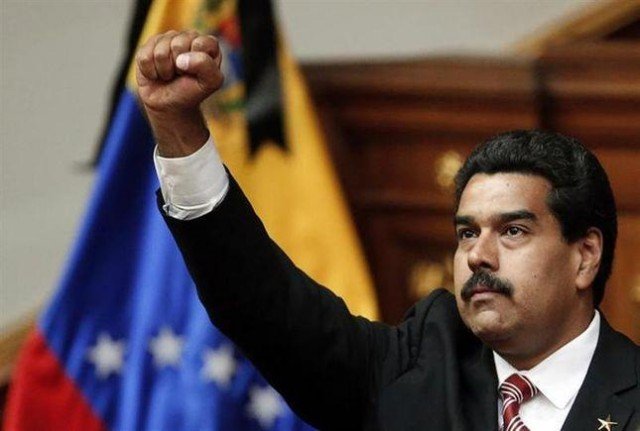
President Nicolas Maduro has ordered their seizure of Daka chain of shops
He said a small air-conditioning unit was selling for 36,000 bolivars ($5,730) at Daka, while the same unit cost 7,000 bolivars ($1,113) in state shops.
Daka’s owners have not responded to the allegations.
Goods at state shops are often very difficult to find and sell very quickly when available.
State shops buy dollars to pay for imported goods at the official rate of around 6.3 bolivars per dollar. But private importers often complain official dollars are not readily available and that they must buy dollars on the black market at rates about seven times higher.
The move against Daka comes after weeks of government warnings against pre-Christmas price rises.
President Nicolas Maduro often accuses wealthy businessmen of hoarding goods in order to push up prices.
But critics of his government say economic mismanagement, rather than unscrupulous retailers, is responsible for inflation and shortages of basic goods such as milk and toilet paper.
Correspondents say inflation, now running at 54%, has become an important issue in next month’s local elections.
Growing economic problems in the oil-producing nation have dented Nicolas Maduro’s popularity.
With municipal elections due across Venezuela on December 8, recent opinion polls have shown the president’s ratings have declined by about 10% in recent months.
Opposition leader Henrique Capriles – who was narrowly defeated by Nicolas Maduro in presidential elections last April – wants next month’s vote to become a quasi-referendum on the president.
Venezuela has announced two light aircrafts have been shot down after entering the country’s airspace over the weekend.
These were the first mid-air attacks by fighter jets since a bill authorizing such action against illegal planes was approved earlier this month, the Bolivarian Armed Forces said.
The aircraft were allegedly smuggling drugs from Central America and refused to follow the military pilots’ orders.
Another 11 unauthorized planes have been disabled on the ground this year.
Venezuelan security forces say more than 35 tonnes of drugs have been found this year.
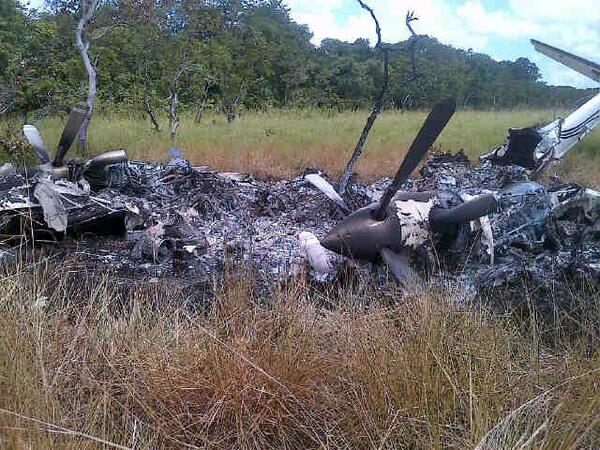
Two light aircrafts have been shot down after entering Venezuela’s airspace over the weekend
The head of Venezuela’s Strategic Operational Centre, General Vladimir Padrino Lopez, told the country’s state television that a plane had been targeted after “all other means of persuasion had been exhausted” in the early hours of Saturday.
“This was the first plane shot mid-air in the country since the approval of the Law and Control Regulation for the Integral Defense of the National Airspace, following the orders of our commander-in-chief, President Nicolas Maduro,” Gen. Vladimir Padrino Lopez said.
Another plane allegedly tried to evade the authorities by trying to land on an illegal airstrip in the jungle and was also shot down.
“These are drug trafficking mafias which intend to use our country as a platform for drug distribution, trespassing our airspace,” the head of the National Anti-Drugs Agency, Alejandro Keleris Bucarito said, after posting a photo of the destroyed plane on Twitter.
After the approval of the airspace bill, earlier in October, President Nicolas Maduro threatened “international narco-traffickers”.
“Any plane entering Venezuela is going to be obliged to land in peace. If not, it will be brought down by our Sukhoi jets, our F-16s and by all of the Venezuelan military aviation,” he said.
During the late President Hugo Chavez’s period in power, the US Drug Enforcement Administration was expelled from the country provoking criticism from Washington that the Venezuelan authorities weren’t doing enough to tackle drug cartels operating in the country.
Venezuela’s President Nicolas Maduro has asked parliament to give him special powers to fight corruption and what he called economic sabotage.
Venezuela is currently facing shortages of food and essential goods, power cuts and soaring inflation.
The measure, used on four occasions by his predecessor Hugo Chavez, would allow Nicolas Maduro to govern by decree for a set period of time.
The opposition fears he will use his powers to stifle any dissent.
A vote to implement the so-called Enabling Law is due to be held in the National Assembly next week.

President Nicolas Maduro has asked parliament to give him special powers to fight corruption and what he called economic sabotage
In a three-hour speech to the assembly, Nicolas Maduro called it a “matter of life or death” for the country’s socialist revolution.
“If corruption keeps expanding and perpetuating its destructive capitalist logic, there will be no socialism here,” he said.
Nicolas Maduro vowed to root out corruption in all aspects of Venezuelan life, stressing that even members of the governing Unified Socialist Party would not be exempt from scrutiny.
Henrique Capriles, the opposition presidential candidate who narrowly lost the election to Nicolas Maduro earlier this year, said the decree would not solve the country’s problems.
“I don’t think this law will bring any economic or social benefit to Venezuelans,” he said.
“They’re going to use the law to persecute and distract the people from their real problems.”
Although Venezuela has the world’s largest oil reserves, its people are suffering from the highest inflation in Latin America, sluggish growth and shortages.
A power cut last month left more than two-thirds of the country without electricity.
Finance Minister Nelson Merentes has conceded that while the social-oriented policies of Hugo Chavez have improved the living standards of many Venezuelans, they did not solve the “structural problems” of the economy.
Hugo Chavez died of cancer in March after 14 years in power.
His vice-president and handpicked successor, Nicolas Maduro, has pledged to continue his policies but does not command the same support enjoyed by Hugo Chavez.
[youtube hN1g-K5lrso]
Venezuela is expelling three US diplomats, whom it accuses of plotting to sabotage the economy.
President Nicolas Maduro said the diplomats have 48 hours to leave the country, adding: “Yankees, go home!”
Nicolas Maduro says he has evidence that the diplomats took part in a power-grid sabotage in September and had bribed Venezuelan companies to cut down production.
The US and Venezuela have been without ambassadors in each other’s capitals since 2010.
The diplomats expelled have been named as Kelly Keiderling – the charge d’affaires and the most senior US diplomat in Caracas – David Moo and Elizabeth Hoffman.
“We completely reject the Venezuelan government’s allegations of US government involvement in any type of conspiracy to destabilize the Venezuela government,” the embassy said in a statement.
It said it had not yet been officially notified of the Venezuelan government decision to expel the three diplomats.
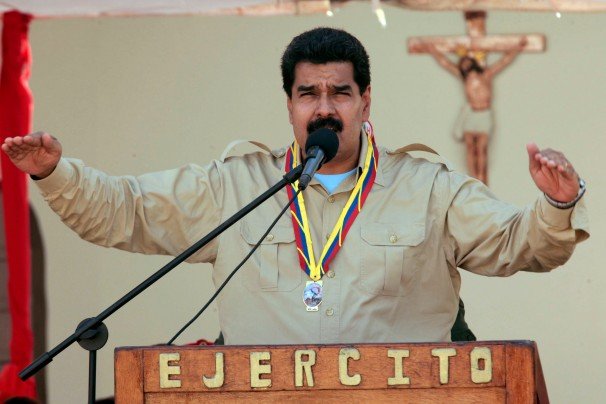
Nicolas Maduro says he has evidence that the US diplomats took part in a power-grid sabotage in September and had bribed Venezuelan companies to cut down production
Nicolas Maduro made the announcement during an official ceremony at the city of Santa Ana.
“Out of Venezuela! Yankees go home! Enough of abuse against the dignity of a peace-loving nation,” he said.
Venezuela is facing a shortage of several goods, including toilet paper, sugar and flour.
The opposition blames Nicolas Maduro’s left-wing policies and rhetoric for the crisis.
Relations between the two countries have been bad for over a decade.
For years, the late President Hugo Chavez denounced “American imperialism” in Latin America.
In December 2010, Hugo Chavez denied a visa to the man appointed to be US ambassador to Caracas, Larry Palmer, over remarks he had made about involvement between the Venezuelan government and Colombian FARC rebels.
“Anyone who comes here as an ambassador has to show respect. This is a country that must be respected,” Hugo Chavez said at the time.
The US retaliated and expelled the Venezuelan ambassador to Washington.
Nicolas Maduro took office as interim president when Hugo Chavez was terminally ill with cancer. He was elected president in April, by a narrow margin, defeating opposition leader Henrique Capriles.
Nicolas Maduro’s new Foreign Minister, Elias Jaua, met the US Secretary of State, John Kerry, during a regional summit in Guatemala in June.
They both said they were determined to improve relations, but the good will did not last long.
Last week, Nicolas Maduro cancelled his scheduled speech at the UN Assembly General, saying that his life would be in danger in New York.
Nicolas Maduro accused two former US officials of being behind the “provocations”.
“The US government knows exactly that these people were behind a dangerous activity being plotted in New York,” he said.
[youtube 1fNluql-73w]
[youtube rR6IjIn6EIA]
Venezuela has taken over Manpa toilet paper factory to avoid any shortage of the product.
The National Guard has taken control of the plant, and officers will monitor production and distribution.
Earlier this year officials ordered millions of toilet rolls to be imported to counter a chronic shortage.
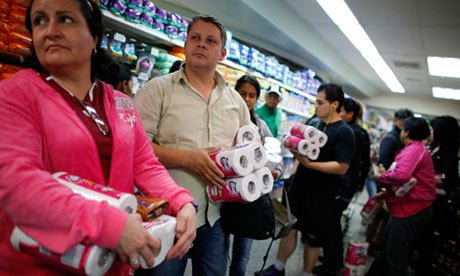
Venezuela has taken over Manpa toilet paper factory to avoid any shortage
Last week President Nicolas Maduro created a special committee to tackle the problem, which the government blames on unscrupulous traders.
The government ordered the temporary occupation of the Manpa plant in the northern state of Aragua, state-run Radio AVN reported.
In a tweet on Thursday, Venezuela’s Vice President, Jorge Arreaza, said authorities would “not permit hoarding of essential commodities, or any faults in the production and distribution process.”
The Minister of Trade, Alexander Fleming, said the factory occupation complied with Venezuelan law.
 Prev1...456...7Next
Prev1...456...7Next  Page 5 of 7
Page 5 of 7

























